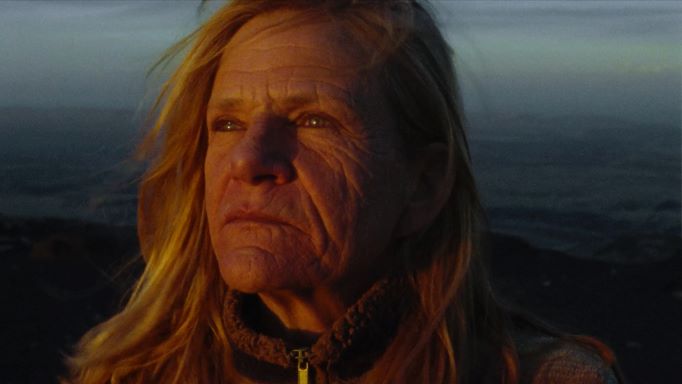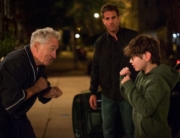There’s not much drama in A Love Song, which is its greatest strength.
Writer-director Max Walker-Silverman’s feature debut follows a widow who’s staying at a southwestern Colorado campground for a couple of days while waiting for an old flame to visit. Faye spends her time identifying bird calls and gazing at the stars—the only two books on the tiny shelf in her trailer are, appropriately, guides to birds and the night sky. To break the silence, she listens to an old-fashioned transistor radio, and the country songs emanating from it emerge as an almost too-perfect commentary on her loneliness.
She also makes the acquaintance of some others at the campsite: the young, accommodating postman; a family of several men (all wearing cowboy hats and carrying shovels) and their spokesperson, a young girl, their sister, who asks Faye if they can move Faye’s trailer to another site so they can dig up the remains of the family patriarch, whom they sort of remember burying there (Faye declines, nicely); and a lesbian couple who invite her for dinner, where Faye hears the story of a proposal that has yet to be made—the conversation will plant a seed later on.
Faye is waiting for Lito, a high-school classmate from the early 1970s, whom she hasn’t seen in decades. She has nearly written him off as she prepares to pack up earlier than originally planned, but the shovel-carrying family returns and the girl asks her to help with their car’s dead engine. After doing so, Faye is offered the group’s canoe. As the precocious kid tells her, “It’ll do you good for recreation and romantic excursions.” “All right,” Faye responds.
When Lito finally arrives, they offhandedly say “howdy” to each other, and A Love Song starts its slow, sometimes mesmerizing dance between these bruised, tired but hopeful people. They reminisce about their teenage flirtation while on the water in her “new” canoe, and he serenades her later with his electric guitar, after which she joins him on her acoustic guitar for a duet.
Although Walker-Silverman makes the most of the photogenic location—a shimmering lake set against a mountain range—his picture-postcard photography is mere background. Instead, the focus is on two fine (and, perhaps, unknown to many viewers) actors. Dale Dickey (Faye) and Wes Studi (Lito) make this familiar almost-romance worthwhile, as their lined and weathered faces and worn-out, weary voices are far more eloquent than the writing and direction. However, Walker-Silverman smartly gives his couple a sort of quiet dignity that allows for silence and contemplation as well as keeping the focus on his stars, especially close-ups of Dickey’s indelible visage, on which is seen both fatigue and resilience.
There’s a touchingly authentic casualness to the way they talk about their deceased spouses, particularly in the most memorable sequence, after Faye invites Lito into her trailer instead of his spending the night in a small pop-up tent. Her radio looms large, of course. She tells him, “Give that dial a spin. It always plays the perfect song, even if at the moment you’re unsure why.” They listen to a tune that Lito finds, eat ice cream, have a beer, and share a kiss, which Walker-Silverman then shyly (or slyly) cuts away from.
Although the couple’s relationship is dramatized in a nicely undramatic way, A Love Song is essentially Faye’s story: Whatever action she takes, she’s aided by the “perfect songs” on her trusty radio to deal with what comes her way. It’s an admittedly obvious conceit, but since it’s as low-key as the rest of the movie, it blends in. Toward the end, when Valerie June’s melancholy tune “Slip Slide on by” comes on, Faye listens, and after a few moments, she mumbles to herself, “Good song,” also an appropriately affirmative response to the gently appealing A Love Song.







Leave A Comment